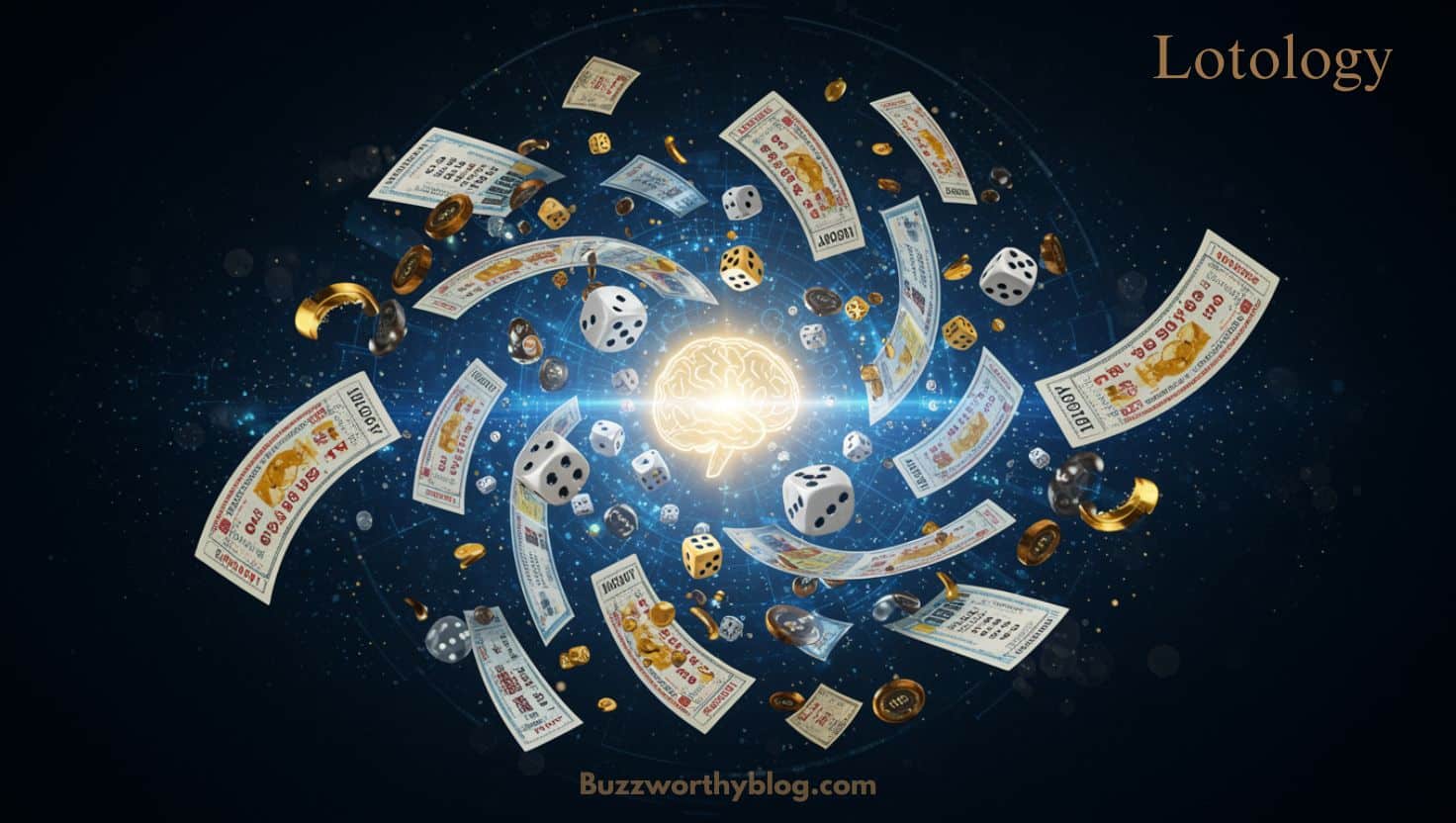Introduction
Lotology is the intriguing discipline that dissects the lottery, integrating psychology, trends, and odds in order to understand what really makes lotteries “tick.”
While to most, the lottery may be a fate-determined game, the lotology definition contradicts this view by examining the forces at work.
Which includes the behaviour of people, the frequencies of numbers, and computing the past draws.
Why do we keep playing when the odds are so long? This post will take you deep into the world of Lotology by showing you how recognising these covert patterns can revolutionise the way you play the lottery.
By presenting you with an educated alternative to a game of chance.
What Is Lotology?

Lotology definition: The Science of Lottery Systems and Predictions. It may sound like a fringe idea, but it comes down to understanding how lotteries work and not merely as machines, but emotionally.
Lotologists check past draws, discover number frequencies, and explore why some combinations are more attractive than others.
This isn’t about “gaming the system,” but rather about approaching the system with a bit more reason, rather than just luck.
At a time of expanding interest in lottery strategy, lotology results allow inquisitive players a chance to participate more rationally with data, not superstition.
The Lottery Obsession
We’ve all purchased a lottery ticket at some point, fantasizing about quitting our jobs or traveling the world.
But beneath the thrill of those lucky numbers lies a complex system far more complicated than pure randomness.
Why do we continue to play even when the stakes are stacked sky high? Enter lotology a curious combination of psychology, statistics and strategy.
This article pulls back the curtain on the lottery world to investigate the rationality behind luck and the rhythms that make people keep coming back.
Suggestion: “Explore more about Artofzio and how it’s revolutionizing digital creativity.”
A Brief History of Lottery Systems
Lotteries are an ancient practice in the literal sense of the word. From ancient Chinese keno slips used as funding for public works to the Roman Empire’s prize-doling spectacles, lotteries have been a form of entertainment and finance.
Europe adopted state-run lotteries in the 15th century as a way to raise money without increasing taxes.
Today, they are part of a multimillion-dollar international industry. Appreciating this evolution is crucial for a better understanding of lotology.
The study of patterns was only feasible because these systems have, as time has passed, been so widely adopted, regulated, and data-rich.
The Psychology Behind the Lottery
Why do we gamble when the odds are awful? A great deal of psychology is behind lottery play.
What whisks people in is hope theory, the emotional payoff of “what if.” The gambler’s fallacy leads us to believe a number is “due” because it hasn’t come up recently.
Lotteries also satisfy our need for control in our uncertain lives, the illusion of being able to affect a random event.
Lotologists don’t just crunch the numbers, but also the psychological forces behind them that lead us to believe the myths that still surround the lottery.
How Lotology Breaks It Down
Under the lotology definition, it is a great guiding thought for it strives for practical methods and details in its attempt to put into order the mechanics of randomness. This includes:
- Shuffling: Finding repeating draw sequences
- Statistical filtering: elimination of unlikely combinations
- Frequency analysis: Keeping an eye on the numbers that get drawn most often
Divination can’t predict winning numbers, but the lotology results yesterday do encourage thoughtful play. Some also use spreadsheets or software to simulate draws and track trends.
It’s about learning to engage the game thoughtfully, not achieving a state of certainty. Consider it a kind of Sudoku for people who are really into the lottery, analytical, and amusing.
Common Myths Debunked by Lotologists
Some lottery players have rituals they swear by, birthdays, avoiding previous jackpot winners, or thinking “hot” numbers are overdue. Lotologists question these things with numbers:
- Myth: “Hot numbers win more.”
- Reality: All draws are independent; what happened in the past doesn’t affect the future.
- Myth: “Quick Picks don’t win.”
- Reality: Statistically speaking, Quick Picks are about as likely to win as any other method, as any numbers drawn are the result of chance and are therefore indiscriminate.
Lotology demystifies by demonstrating that while there are patterns, they don’t equal guarantees; they provide clues, not answers.
Should You Use Lotology?
Lotology definition can be an interesting hobby, especially if you enjoy data, puzzles, or logic games.
It’s not going to make you rich, but it can make playing the lottery more interesting.” Some use it for a sense of control, some to debunk popular myths.
Playing responsibly is important. The results of yesterday’s lotology should never supplant financial planning or be relied on as an income strategy. Consider it as a systematised form of entertainment, not as a get-rich-quick scheme.
Lotology Terminology
| Term | Definition |
| Lotology | The study and exploration of lottery systems, their design, history, and cultural impact. |
| Lotologist | Someone who practices lotology. |
| Hot Numbers | Numbers that have been drawn more frequently recently. |
| Cold Numbers | Numbers that have been drawn less frequently recently. |
| Gambler’s Fallacy | The belief that past events influence future outcomes in random events. |
Lotology in Practice: Tools and Strategies
Pattern Recognition
Blocks of the same draw numbers. Repeats of drawing schedules can be used to recognize drawings of numbers.
And although each draw is separate, there is still fun in picking numbers and spotting patterns.
Statistical Filtering
Not taking into account unlikely pairs (applying statistical analysis), would get us to a more balanced numbers choice.
Frequency Analysis
Keeping a record of how frequently individual numbers have been drawn can help steer you away from picking numbers that are rarely drawn.
Understanding the Psychology Behind Lottery Play
Hope and Optimism
And there is always a song and a dance, even if it is just a sliver of hope, that keeps them going.
Gambler’s Fallacy
Some players are convinced of the “due” theory, that numbers are stuck in a queue waiting their turn to win.
Illusion of Control
Choosing their own numbers makes participants feel they’re in control, even though the results are not.
Conclusion
Lotology presents an unexpected point of view of something we tend to see as completely random.
And though it cannot change the odds, it does illuminate the systems, patterns, and even psychology that shape lottery play.
Through the consideration of former draws and the demystification of certain beliefs, the lottery definition takes the lottery from pure chance to a brain-friendly pursuit.
If you’re intrigued about the underpinning truth about the numbers, or would rather play smarter, lotology results from yesterday are a fascinating field of study.
Ready to dive deeper? Subscribe to our newsletter for expert knowledge and tips on the world of lotology.
FAQs
What is lotology?
Lotology is the science of analysing patterns, psychology, and statistics behind lottery systems.
Will lotology increase your chances of winning the lottery?
While lotology won’t give you winning numbers, it can help you tailor numbers to play more strategically.
What are some methods the lotologists use in the lottery?
Lotto players study the results of previous draws, number frequencies, and patterns to give themselves an edge.
Is lotology a superstition?
No, for lotology is built on data and logical analysis, not superstition or chance.
Can I use lotology to win the lottery?
If you like patterns and strategy, lotology is a smart way to play the lottery.

Buzzworthy Blog is a dynamic content hub with the latest trends, insights, and expert advice across multiple niches. With a focus on quality and relevance, Buzzworthy Blog keeps readers informed and engaged, offering fresh perspectives on tech, lifestyle, business, and more to inspire every reader.
